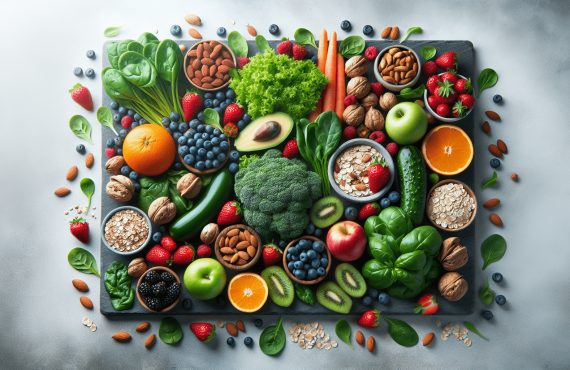Are you looking for some valuable nutrition tips to improve your overall health and wellness? Look no further than the perspective of a chiropractor. At Henry Chiropractic, owned and operated by Dr. Craig Henry in Pensacola, Florida, you can find professional guidance on achieving optimal nutrition for a healthier life. Dr. Henry, along with another chiropractor, Dr. Aaron Hixon, are passionate about helping others and are dedicated to using their expertise to enhance your well-being. From managing back and neck pain to starting your day feeling refreshed, their chiropractic care can make a positive difference. So, let’s delve into their nutrition advice from a chiropractor’s perspective and begin your journey to better health.
Table of Contents
Importance of Nutrition
Good nutrition is essential for maintaining overall health and well-being. Proper nutrition provides the body with the necessary nutrients to function optimally and support various bodily processes. It is not just about counting calories or focusing on weight loss; nutrition goes beyond that. As a chiropractor, I emphasize the importance of nutrition in conjunction with chiropractic care to help my patients achieve optimal health.
The Link Between Nutrition and Chiropractic Care
Nutrition plays a critical role in supporting chiropractic care. Many people seek chiropractic care to alleviate pain, improve posture, and enhance overall wellness. But without proper nutrition, the body may struggle to heal and maintain the benefits of chiropractic adjustments. By providing the body with the right nutrients, you can enhance the effectiveness of your chiropractic treatments and support long-term wellness.
Nutrition as a Vital Component of Overall Health
Proper nutrition is not just about maintaining a healthy weight; it is an essential component of overall health. A well-balanced diet that includes a variety of nutrient-dense foods can help prevent chronic diseases, boost the immune system, promote healthy digestion, and improve energy levels. By fueling your body with the right nutrients, you can support your overall health and well-being.

How Nutrition Can Affect Spinal Health
The spine plays a crucial role in maintaining proper posture, supporting movement, and protecting the nervous system. Nutrition can have a profound impact on spinal health. Adequate intake of key nutrients such as calcium, vitamin D, and magnesium is essential for maintaining strong bones and joints. Additionally, consuming foods rich in omega-3 fatty acids can help reduce inflammation, which can contribute to spinal health issues. By incorporating a diet focused on spinal health, you can support the integrity and function of your spine.
Basic Nutritional Principles
When it comes to nutrition, there are several basic principles to keep in mind.
Balanced Diet: The Key to Optimal Nutrition
A balanced diet is crucial for providing the body with the necessary nutrients it needs. Incorporating a variety of fruits, vegetables, whole grains, lean proteins, and healthy fats into your meals can ensure you are getting a wide range of vitamins, minerals, and antioxidants.
Understanding Macronutrients and Micronutrients
Macronutrients, including carbohydrates, proteins, and fats, provide the body with energy, while micronutrients, such as vitamins and minerals, are essential for proper bodily functions. It’s important to understand the role of each macronutrient and ensure you are getting a good balance in your diet.
Importance of Hydration
Staying hydrated is essential for overall health and well-being. Water helps to maintain proper bodily functions, supports digestion, aids in nutrient absorption, and helps regulate body temperature. Aim to drink an adequate amount of water throughout the day to stay properly hydrated.
Anti-Inflammatory Foods
Inflammation is a natural response of the immune system to injury or irritation. However, chronic inflammation can contribute to various health issues, including pain and discomfort. Incorporating anti-inflammatory foods into your diet can help reduce inflammation and support overall health.
Why Inflammation is a Concern
Chronic inflammation can lead to the development and progression of various diseases, including heart disease, arthritis, and certain types of cancer. By reducing inflammation in the body, you can minimize the risk of these conditions and promote better overall health.
Foods That Reduce Inflammation
Certain foods have anti-inflammatory properties and can help reduce inflammation in the body. These include fatty fish like salmon and sardines, leafy greens such as spinach and kale, fruits like berries and cherries, nuts and seeds, and healthy fats like olive oil and avocado.
Incorporating Anti-Inflammatory Foods Into Your Diet
To incorporate more anti-inflammatory foods into your diet, try adding fatty fish to your meals a few times a week, incorporating leafy greens into salads or smoothies, snacking on nuts and seeds, and swapping unhealthy fats with healthier alternatives like olive oil.

Gut Health and Nutrition
The health of your gut plays a crucial role in overall well-being. The gastrointestinal tract is home to trillions of bacteria that support digestion, immune function, and even mental health. Nourishing your gut with the right foods can promote a healthy microbiome and support optimal nutrition.
The Gut-Brain Connection
The gut-brain connection refers to the bidirectional communication between the gut and the brain. The health of your gut can influence your mood, cognitive function, and overall mental well-being. A healthy gut microbiome is essential for maintaining this connection and supporting optimal brain health.
Foods That Promote Gut Health
To support gut health, focus on incorporating foods that are rich in fiber, such as fruits, vegetables, and whole grains. These foods provide fuel for the beneficial bacteria in your gut, promoting a diverse and healthy microbiome.
Importance of Probiotics and Prebiotics
Probiotics are beneficial bacteria that can be found in certain fermented foods like yogurt, sauerkraut, and kimchi. Including probiotic-rich foods in your diet can help restore and maintain a healthy balance of gut bacteria. Prebiotics, on the other hand, are non-digestible fibers that serve as food for the beneficial bacteria in your gut. Foods like garlic, onions, and bananas are excellent sources of prebiotics and can help support a healthy gut microbiome.
Nutrition for Pain Management
Certain foods and nutrients have been found to have analgesic properties, meaning they can help reduce pain and inflammation in the body. By incorporating these foods into your diet, you may be able to manage pain more effectively.
Foods That Can Help Reduce Pain and Inflammation
Several foods have been found to have anti-inflammatory and pain-relieving properties. Turmeric, ginger, and tart cherries are known for their ability to reduce inflammation and alleviate pain. Additionally, omega-3 fatty acids found in fatty fish, walnuts, and flaxseeds have been shown to reduce pain and inflammation.
The Role of Antioxidants in Pain Management
Antioxidants are compounds that help protect the body from oxidative stress and inflammation. They can help neutralize free radicals, which are unstable molecules that can damage cells and contribute to pain and inflammation. Foods rich in antioxidants, such as berries, dark chocolate, and green leafy vegetables, can be beneficial for managing pain.
Supplements That May Support Pain Relief
In addition to incorporating pain-relieving foods into your diet, certain supplements may also support pain relief. These include fish oil supplements for their anti-inflammatory properties, turmeric or curcumin supplements for their pain-reducing effects, and magnesium supplements for their muscle relaxant properties.
Nutrition for Spinal Health
The health of your spine relies on proper nutrition to maintain strength and flexibility. Including key nutrients in your diet can support spinal health and prevent issues such as degeneration and pain.
Key Nutrients for Supporting Spinal Health
Calcium, vitamin D, and magnesium are vital for maintaining strong bones and supporting spinal health. Calcium is essential for bone structure, while vitamin D helps with calcium absorption. Magnesium is involved in the contraction and relaxation of muscles and plays a role in maintaining healthy spinal discs and joints.
Foods That Promote Strong Bones and Joints
To support spinal health, focus on incorporating foods that are rich in calcium, such as dairy products, leafy greens, and fortified plant-based milk alternatives. Sun exposure is an excellent source of vitamin D, but you can also find it in fatty fish, egg yolks, and fortified foods. Magnesium-rich foods include nuts, seeds, legumes, and leafy greens.
The Role of Omega-3 Fatty Acids in Spinal Health
Omega-3 fatty acids have been shown to have anti-inflammatory properties and can help reduce inflammation in the body, including the spine. Fatty fish like salmon, mackerel, and sardines are excellent sources of omega-3 fatty acids. If you don’t consume fish, you can also find omega-3s in walnuts, chia seeds, and flaxseeds.
Dietary Tips for Optimal Wellness
In addition to specific nutrients for spinal health and pain management, focusing on overall dietary habits can promote optimal wellness and support chiropractic care.
Importance of Whole, Unprocessed Foods
Aim to include whole, unprocessed foods in your diet as much as possible. These foods are rich in nutrients and free from artificial additives, which can contribute to inflammation and other health issues. Fruits, vegetables, whole grains, lean proteins, and healthy fats should form the foundation of your meals.
The Benefits of a Plant-Based Diet
Plant-based diets have been shown to have numerous health benefits. They are rich in fiber, antioxidants, and phytochemicals that can support overall health and reduce the risk of chronic diseases. Incorporating more plant-based meals into your diet can improve digestion, support weight management, and boost your immune system.
How to Incorporate Healthy Fats Into Your Diet
Not all fats are created equal, and healthy fats are an essential part of a balanced diet. Include sources of healthy fats like avocados, nuts, seeds, and olive oil in your meals. These fats are important for brain health, hormone production, and nutrient absorption.
Nutrition and Chiropractic Care for Athletes
Athletes have unique nutritional needs to fuel their performance and support recovery. Nutrition plays a crucial role in enhancing athletic performance and promoting optimal health.
Optimizing Nutrition for Athletic Performance
To optimize nutrition for athletic performance, athletes should focus on consuming adequate amounts of carbohydrates, lean proteins, and healthy fats. Carbohydrates provide energy, while proteins support muscle repair and growth. Healthy fats help with hormone production and provide a concentrated source of calories.
The Importance of Timing Meals Around Training
Timing meals and snacks around training sessions is essential for maximizing performance and recovery. Pre-workout meals should include carbohydrates for energy, while post-workout meals and snacks should focus on replenishing glycogen stores and aiding muscle recovery.
Hydration Strategies for Athletes
Proper hydration is vital for athletes, as dehydration can negatively impact performance and lead to fatigue and muscle cramps. Athletes should aim to drink fluids before, during, and after training sessions or competitions to stay adequately hydrated.
Nutrition for Stress Management
Chronic stress can have a significant impact on overall health, including nutritional status. Nourishing the body with the right foods during times of stress can support the body’s stress response and promote overall well-being.
The Impact of Stress on Nutrition
Stress can lead to changes in eating habits, such as emotional eating or choosing convenience foods that are often low in nutritional value. Chronic stress can disrupt digestion, nutrient absorption, and metabolism, which can further contribute to nutritional deficiencies.
Foods That Support the Body’s Stress Response
Some foods can help support the body’s stress response and promote a sense of calm. Foods rich in B vitamins, such as whole grains and leafy greens, can help support the nervous system. Foods high in antioxidants, such as berries and dark chocolate, can help reduce oxidative stress caused by chronic stress.
The Role of Mindful Eating in Stress Management
Practicing mindful eating can help manage stress and improve nutrition. Mindful eating involves paying attention to the sensory experience of eating, including the taste, texture, and smell of food. Taking the time to enjoy meals and savor each bite can help reduce stress and improve digestion.
Eating Habits and Posture
The way you eat can have an impact on your posture and spinal alignment. By being mindful of your eating habits and making a few adjustments, you can support good posture and prevent issues related to spinal health.
How Eating Habits Can Affect Posture
Slouching, slumping, or hunching over while eating can strain the muscles of the back and neck, leading to poor posture. Additionally, eating large meals or eating too quickly can cause bloating and put pressure on the spine, further contributing to poor posture.
Tips for Maintaining Good Posture During Meals
To maintain good posture while eating, sit up straight and avoid leaning forward or hunching over. Keep your shoulders relaxed and your feet flat on the floor. Use proper ergonomics when eating at a table or desk, ensuring that the table is at the appropriate height for you.
The Relationship Between Nutrition and Spinal Alignment
Proper nutrition plays a role in maintaining healthy bones, muscles, and joints. By nourishing your body with the right nutrients, you can support spinal alignment and prevent issues such as osteoporosis, muscle imbalances, and joint deterioration.
Incorporating proper nutrition into your lifestyle, in conjunction with chiropractic care, can have a significant impact on your overall health and well-being. When you provide your body with the necessary nutrients, you support the body’s natural healing processes and promote optimal function. If you have any questions or concerns about nutrition and its role in chiropractic care, reach out to the professionals at Henry Chiropractic. They can provide guidance and support to help you achieve your health and wellness goals.























